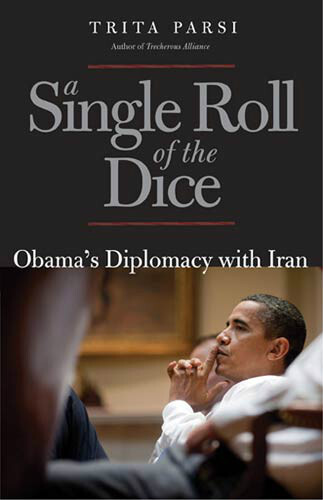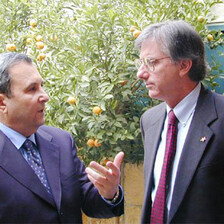The Electronic Intifada 21 February 2012

Trita Parsi’s A Single Roll of the Dice: Obama’s Diplomacy with Iran asks whether Barack Obama fulfilled his presidential campaign pledge to seek a diplomatic solution to the US conflict with Iran over its nuclear program. Parsi answers the question in the title, asserting that the Obama administration gave diplomacy a single roll of the dice — and a half-hearted one at that — before deciding to pursue sanctions, and in effect, short-circuiting any hopes of genuine diplomatic engagement.
After more than thirty years of mistrust, enmity, and US saber-rattling, what was needed, Parsi argues, was a determined, multi-stage effort to give diplomacy a chance.
Parsi is the president of the National Iranian American Council (NAIC), an academic and a contributor to a number of media outlets. He is best known as the author of the 2007 book Treacherous Alliance: The Secret Dealings of Israel, Iran, and the US, an eye-opening account of the decades-long conflicts and cooperation between all three nations as each pursued what Parsi describes as their own “hegemonic” ambitions in the Middle East.
Realist approach
Parsi hails from the realist school of foreign policy analysis. This becomes evident quickly in both works. Put far too simply, the realist school argues that strategic national interests, rather than ideology, dominate foreign policy decisions and account for the fact that nations try to advance their interests by seeking hegemony over rival nations. As the son of an Iranian who experienced political persecution under both the Shah of Iran and the Islamic republic, Parsi’s NAIC represents Iranian-Americans who uphold democratic rights and oppose military intervention and punitive sanctions against Iran, arguing that both will likely worsen the human rights situation there.
The bulk of the book is an exhaustive account of what happened to Obama’s campaign pledge, particularly after the Israeli government and its lobby in the United States challenged the very notion of diplomacy. Despite this opposition, the Obama administration did make a proposal in June 2009 that led to direct, face-to-face negotiations with Iran in October that year.
The proposal called for Iran to ship most of its low-enriched uranium to Russia for further enrichment so that it could be used in a nuclear reactor that supplies medical isotopes needed to treat and diagnose nearly a million Iranian cancer patients. Iran initially was agreeable to the idea but grew mistrustful, particularly at the role France was playing in the negotiations. Iran had previously been burned in a uranium enrichment deal with France, an experience that some experts say was a prime motivator for Iran’s quest for nuclear energy independence.
The talks eventually became stalemated. That is when Turkey and Brazil entered the picture. Given letters of approval from Obama to act as mediators, these two countries managed to secure Iran’s agreement to a proposal allowing Turkey to hold Iran’s low-enriched uranium in “escrow” while fuel pads needed for Iran’s nuclear reactor were processed. This would guarantee that Iran would get back its low-enriched uranium if the fuel pads were not delivered. The resulting Tehran Declaration in May 2010 appeared to be a significant diplomatic breakthrough.
Ross calls the shots
Unknown to Turkey and Brazil, however, the Obama administration had all along been operating under a plan designed by Dennis Ross, a key figure in the administration who was closely connected to the Israel lobby. Known as the “hybrid option,” the plan called for the United States to pursue unconditional negotiations with Iran while simultaneously seeking tougher sanctions, focusing in particular on offering incentives to China and Russia for their support in the UN Security Council.
Just days before Iran agreed to the Turkey-Brazil proposal, the United States won China and Russia’s agreement to support tougher UN sanctions. Also, long before any negotiations began, Obama had assured Israeli Prime Minister Benjamin Netanyahu in a May 2009 meeting at the White House that diplomacy had an end-of-year timetable after which sanctions and the military option would be on the table, according to leaked State Department cables made available by WikiLeaks. The year-end deadline had passed, China and Russia were on board, and the Obama administration ended up rebuking Brazil and Turkey for their mediation efforts.
Parsi’s book focuses on the single issue of diplomacy, but nevertheless it tackles a number of related issues.
An existential threat?
He highlights how despite Israel’s propaganda claim that Iran’s nuclear program represents an “existential threat,” Israeli Defense Minister Ehud Barak in February 2010 said, “I don’t think the Iranians, even if they got the bomb, [would] drop it in the neighborhood. … They fully understand what might follow. They are radical but not totally crazy. They have a quite sophisticated decision-making process, and they understand reality.”
Parsi quotes Ephraim Sneh, Israel’s former deputy minister of defense, to show that what Israel really fears is the undermining of its role as a dominant regional power. “I don’t want the Israeli-Palestinian negotiations to be held under the shadow of an Iranian nuclear bomb,” Sneh said, in an interview conducted for this book.
Parsi also maintains that Israel has long feared that it might one day be abandoned by the United States. He quotes a prediction made by an advisor to Netanyahu: “The Great Satan will make up with Iran and forget about Israel.”
Moreover, he argues that if the goal of sanctions is to oust the current Iranian government, it will do little to end Iran’s nuclear ambitions since nearly all segments of Iranian society, including the reformist Green Movement, support Iran’s quest for a civilian nuclear energy program. In fact, Parsi shows, many reform leaders attacked Iranian president Mahmoud Ahmadinejad for making too many concessions in the negotiations.
People power not addressed
Parsi’s book has two significant failings. One is probably inherent in an outlook that fails to account for the possibility that popular uprisings could reorient the whole conflict toward a focus on international law and human rights. It is simply assumed that none of the great powers will ever entertain the notion of a nuclear weapons-free Middle East since that would involve Israel agreeing to abolish the estimated 200 to 400 nuclear weapons it has acquired. Just as no one anticipated the Arab uprisings, so it is unwise to ignore the potential power of millions of ordinary people insisting on justice, human rights and international law as a framework for peace.
The other failing is the omission of analysis on the series of events that occurred during George W. Bush’s last year in office when Israel proposed a joint preemptive air strike against Iran. The Bush administration turned down the request, but agreed instead to conduct a joint covert campaign of sabotage against Iran.
According to the British journalist Andrew Cockburn, Bush issued a “finding” that gave executive approval to assassinations, even though an executive order issued in the 1970s forbids political assassinations. This covert war, still being waged against Iran, has significantly increased the likelihood of open warfare.
Rod Such is a freelance writer and former editor for World Book and Encarta encyclopedias. He is a member of the Seattle Mideast Awareness Campaign and Americans United for Palestinian Human Rights.






Comments
Another review of the book,
Permalink lidia replied on
Another review of the book, VERY different one (from the anti-imperialist POV)
http://www.bostonreview.net/BR...
A Single Roll of the Dice is not written as a case for war against Iran—something that Parsi claims he does not want. But, like Pollack, Parsi advances baseless evidence and agenda-driven analysis. And, in the same way that Pollack’s work helped pave the way for invading Iraq, Parsi’s book—by reinforcing conventional wisdom about Iranian politics and Obama’s Iran policy and counseling bad policy—raises the risk of another U.S.-initiated war in the Middle East.